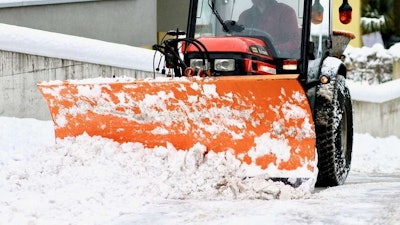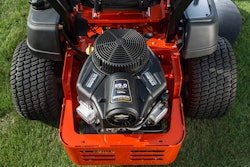 Photo: Pixabay
Photo: PixabayThe time has finally come to begin planning for snow season, and this means pulling out the plows.
The Automobile Protection Agency (APA) says that many modern vehicles will experience deterioration from corrosion after about five or six years; this can result in increased maintenance and repair costs or causing the resale market value of the vehicle to decrease.
When it comes to snow equipment care and maintenance, there are a few key things to keep in mind to prevent corrosion from occurring. Take a look at a few simple steps you can take to help your equipment fight rust and keep from biting the dust.
Preventative measures
When pulling these machines out of storage and getting them ready to hit the slopes, one of the first steps to take is to wash the equipment. Before the snow begins to fall and the temperatures drop, go ahead and get that bad boy out for a bath. If you find during the season that you are dealing with heavily salted areas frequently, you will want to wash the equipment more often throughout the season to keep salt corrosion at bay.
While washing, be sure to check for rust spots that might already be present. If you do find some existing spots, wash the area thoroughly, sand the rust off and repaint the area. This will help give the metal a protective coat. After washing the equipment, be sure to grease all of the moving contact points.
Before and after each use, be sure to check the electrical connections and make sure they are not corroding. If you do see some corrosion beginning, there are a few steps you can take to prevent connection issues in the future.
First, ensure there is no power running to the area you are cleaning. Disconnect the battery from the truck or disconnect the plow from the truck. After this, remove the terminal or plug that needs to be inspected.
If the terminal or plug is broken or loose, replace it, but if it appears to be working, use a small wire brush to clean off the corrosion. Once that’s taken care of, add dielectric grease to all terminals before you plug them back in. Dielectric grease prevents salt, water and dirt from gathering and causing corrosion.
Corrosion prevention products
Choosing the right products is also instrumental when it comes to taking care of snow care equipment. According to Greg Lawrie, president of Pro Fleet Care Franchising, there are three main products that are used to control corrosion: Cathodic protection (CP), oil products and wax and tar products.
CP helps reduce the corrosion rate of a metallic structure by reducing the potential of corrosion by bringing the metal closer to an immune state. Lawrie adds that CP is also commonly used on metal structures, pipelines and water vessels.
As oil products penetrate hard-to-reach areas, they neutralize the harmful effects of rust. To get the best results from using oils, Lawrie says machines should be oiled yearly or as required.
Wax and tar products, according to Lawrie, are not known to penetrate hard-to-reach areas of the vehicles. They also have a tendency to dry out and crack, which in turn will allow moisture and salt to become trapped and accelerate corrosion. If these types of products are used, it’s imperative to make sure the machine is dry; if these products are allowed to sit on water, they will accelerate corrosion.
When it comes to choosing a product for oiling, Lawrie says to be sure to look for ones that are specifically designed for corrosion control. Less viscous products will have a thinner oil and will offer a better penetrating ability for harder-to-reach areas. More viscous products will have heavier oils and will protect treated metal longer.
Storage
Plows should be stored in dry, cool places, and it’s important to ensure that it’s covered. Be sure not to tighten the cover too much, as tight covers encourage condensation collection and can end up damaging the plow.
Controllers are also prone to corrosion, so be sure not to leave them in the machines in the off season. Humidity and heat in the summer months can end up damaging these controllers if they are left in the machine, so keep them in an office or garage.
If equipment has to be stored outdoors, be sure to keep them on pavement, gravel, on top of a shipping/storage container or on blocks with a tarp over them.











